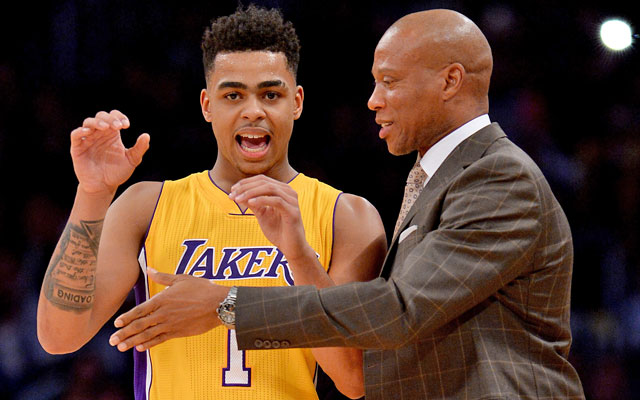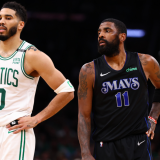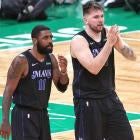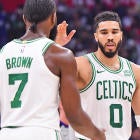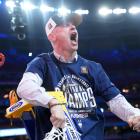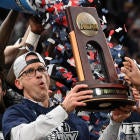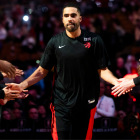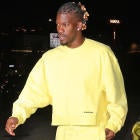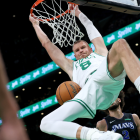With a little less than one month left in Kobe Bryant's magnificent career, his farewell tour with the Lakers continues to be one of basketball's most fascinating train wrecks. Despite their 16 championships -- five with Bryant -- an otherwise glorious era is winding down in anything but storybook fashion.
The Lakers are a certified Hollywood horror show.
In a season that has been all about glorifying Bryant's 20-year career, the page now flips to the future -- and how bright or dim it might be in Bryant's afterglow. Like the other 29 NBA teams, the Lakers' front office has been focused on scouting the conference tournaments, and soon, the NCAA Tournament, in the hopes of mining the field for a few bright, shiny objects that can help them take the next step.
For the Lakers, there's no place to go but up -- and the stakes couldn't be higher over these final 15 games.
With the 29th-worst record in the league (14-53), the Lakers currently possess 55 percent odds of keeping their first-round pick. Should they fall out of the top three in the lottery, the pick would be transferred to the Philadelphia 76ers (the obligation stemming from the ill-fated Steve Nash trade in 2012).
Though league executives are touting this draft as a step down from the past couple of years, the Lakers desperately need another top-flight talent to add to their rebuilding equation -- difficult as it has been to decipher that equation with Bryant commanding so much attention. To think of it in harsher terms, the pick is not so much a person as it is an asset -- one that the Lakers cannot afford to lose.
Which begs the question: Why does Byron Scott continue to finish games with a veteran lineup while sitting the franchise's future on the bench? DeAngelo Russell and Jordan Clarkson started against the Knicks on Sunday night, but watched Lou Williams and Marcelo Huertas finish off a 90-87 loss to New York at Staples Center -- with former coach Phil Jackson watching from the stands.
"Like I've said before," Scott explained, "the first thing is, you're trying to win games."
But are they? I thought this Lakers season was about giving Bryant his proper sendoff and developing Russell, Clarkson and Julius Randle, who are supposed to be the cornerstones of the coming rebuild.
"They have had enough experience doing that so far," Scott said.
Last month, it was revealed that Scott would be coaching the balance of the season for his job; he has a year left on his contract plus a team option. In that regard, he can join the club. Pretty much every coach this side of Gregg Popovich is coaching for his job on a nightly basis. But when the Lakers' priorities are so conflicted, it's difficult to identify what, exactly, Scott's job is.
Develop the kids or genuflect to Kobe? Keep the pick or stubbornly try to win a few more pointless games?
Among about a dozen rival executives informally polled about the Lakers' building blocks of Russell and Randle, a consensus emerged: Russell is a potential star, while Randle is viewed as "a piece" or "an energy guy." The Lakers need more talent if they're going to build a team around Russell that can win. It's just a matter of how they go about it.
Randle, 21, has shown signs of being an elite rebounder, averaging 10.1 per game in just shy of 28 minutes to go with 11.7 points. Russell, 19, has had his struggles, but has thrived since getting his starting job back 11 games ago. Despite a 1-for-7 night against the Knicks, Russell is averaging 21.5 points on 46 percent shooting with 4.5 assists during this stretch.
The most important numbers in the above paragraph, of course, are 21 and 19. Unless you're Bryant or LeBron James, you don't project superstardom at that age.
"Russell could be a big piece," one executive said, "but I'm not sure Randle is a cornerstone."
Several executives inserted the caveat that they're barely old enough to vote and don't even have a full season on their resumes yet.
"They should know by the end of next season," one of them said.
But when you're the Lakers -- when you haven't been to the conference finals since 2010 under Jackson, and when you haven't had a winning season since the 2012-13 campaign that ended with the Bryant-Nash-Dwight Howard-Pau Gasol team getting swept by the Spurs in the first round -- how patient can you afford to be?
Russell and Randle, one executive noted, "will have value in a trade to get a better player."
That's the crux of where the Lakers are. Assuming they're able to keep their pick, do they continue building through the draft and follow the model that has worked so well in San Antonio and Oklahoma City? Or do they cash in their chips to trade for a star?
If they learned anything from the Howard debacle, a star needs other stars to play with -- and the Lakers' talent pool isn't even close to what it was when Howard arrived via trade in 2012. Typically, a roster has to be gutted to get a star in free agency or in a trade. With the looming cap spike, that won't be the case this summer. But does Kevin Durant want to walk away from Russell Westbrook, Serge Ibaka and a winning organization that has figured out how to sustain success? And does he want to do that to play with Russell and Randle while waiting three-plus years for this year's first-round pick (if L.A. keeps it) to develop?
Durant, 27, would be better off staying, and the Lakers might just be better off with a more patient approach. Either way, they'll have to ask themselves if Scott is the right coach to pilot either one of those plans for 82 games next season. Making a fair judgment on what kind of job he did this season under the circumstances will be difficult, but that's GM Mitch Kupchak's job.
So with 15 games left in Bryant's masterful run, which culminates in an otherwise demoralizing season, the Lakers must now begin to come to grips with life after Kobe. It'll be different, for sure. Will it be better? It depends on how the Lakers want to get there.
